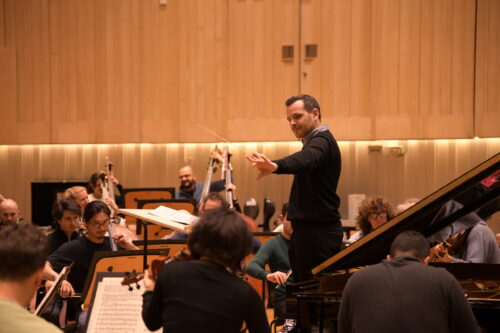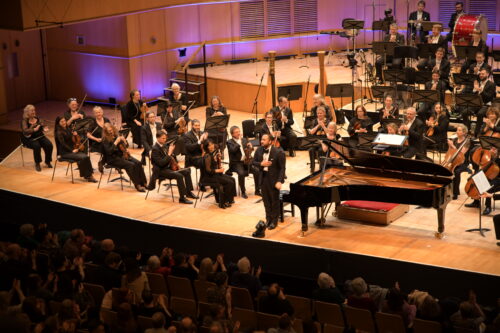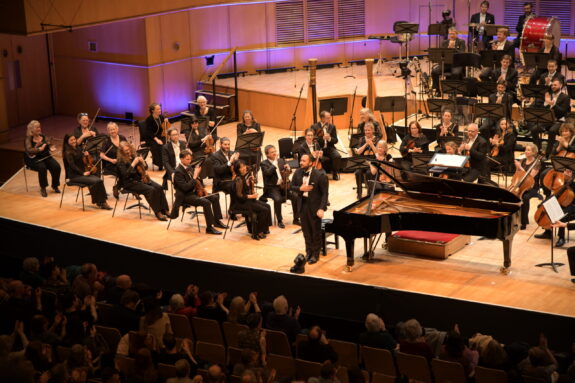 United Kingdom Farrenc, Bartók, Rachmaninov: Jonathan Mamora (pianist), Royal Scottish National Orchestra / Lionel Bringuier (conductor). Glasgow Royal Concert Hall, 8.3.2025. (GT)
United Kingdom Farrenc, Bartók, Rachmaninov: Jonathan Mamora (pianist), Royal Scottish National Orchestra / Lionel Bringuier (conductor). Glasgow Royal Concert Hall, 8.3.2025. (GT)

Farrenc – Overture No.2 in E-flat major, Op.24
Rachmaninov – Piano Concerto No.3 in D minor, Op.30
Bartók – Concerto for Orchestra, Sz. 116, BB 123
One of the most interesting features in recent years has been the appearance of works by female composers in concerts; the works of Gibbs, Smyth, Boulanger, Price, and Bacewicz have made more appearances in concert programmes.
Louise Farrenc (1804-1875) studied at the Paris Conservatoire and was the first woman to be awarded a professorship in piano there. She won recognition throughout Europe when her chamber music, songs, piano works, and symphonies were widely performed – yet her creativity largely disappeared in the last century. The second of her two concert overtures was written in 1834 when few composers were writing overtures, except perhaps for Berlioz and Mendelssohn – who turned to Shakespeare for their inspiration.
I had never heard Farrenc’s music before, and I was amazed that this piece is not heard more often – it could have been written by a more celebrated composer – it is so vivid and radiantly scored. The overture opens on the strings with a clearly expressed idea and is supported by the woodwind with an underlying murky tragic character. There were transitory upsurges from the brass and the woodwinds – all delightfully orchestrated, embracing harmonious interplaying before closing on a bright, more optimistic climax. The captivating nature of Farrenc’s overture reveals her vibrant creativity and inventive skill and is imbued with a brilliance typical of the Viennese school.
The centrepiece of this programme was the winner of the 2023 Scottish Piano Competition in Jonathan Mamora’s performance of the Rachmaninov Piano Concerto No.3. This Indonesia/American pianist made a big impression two years ago here in Glasgow. In attending the early rounds, though I thought other pianists deserved to get to the final, Mamora was a worthy winner playing the Rachmaninov Third Concerto.
The opening chords in the Allegro ma non troppo were somewhat muted and introspective, perhaps Mamora was preparing for what was to come, however, the problem was that the orchestral playing was out of balance with the piano. There was little affinity between conductor Lionel Bringuier and Mamora – resulting in a lack of warmth and emotion. This soon resolved as there emerged some exquisite playing from the verdantly rich strings and the charming woodwind evincing all the dark Slavic themes of Rachmaninov’s score. Mamora’s extended Ossia cadenza was spinetingling in its intensity and embroidered with eloquent solos from the flute of Jack Welch, Timothy Orpen on clarinet, and Steven Hudson on the oboe, and by a vivid solo from the horn of Jake Parker.
In the slow movement Intermezzo: Adagio, the extraordinary collaboration between the orchestra and the soloist was heightened by another exquisite cadenza from Mamora. The Finale: Alla breve was thrilling with all the rich harmonies of Russian romanticism, and the suggestion of Russian Orthodox chant from the composer’s Vespers reprised from the opening movement. Following the exhilarating culmination, the thundering applause by the enthusiastic audience led to Mamora giving a superb encore of Scriabin’s Sonata No.4 in F-sharp major, bringing out the calm expressiveness and closing ecstatically and in celebratory fashion – itself a rarity among encores.

The most startling work of the evening was Bartók popular concerto which was written in his final years suffering from leukemia. The French conductor Bringuier revealed outstanding mastery in commanding a remarkable performance. Taking over from Jack Welch, Katherine Bryan’s delightful solo flute decorated the Introduzione, matched by the solo passage by Steven Hudson’s oboe invoking gorgeous rhythmic folk colours. Bartok’s folk-influenced harmonies were palpable in the interactions between the horns and the strings. The snare drum strokes by Simon Lowdon were spectacular in the second movement, Presentando le coppie while the colourful sequences of the woodwind pairs were adorned by outstanding brilliance, before once again, the tapping on the snare drum closed this fascinating music.
The mood of the Elegia summoned the composer’s nostalgia for Hungary with the nocturnal folk refrains emerging on strings and the woodwind, expressed magically by the two harps. By now, it was clear the orchestra were showing the type of world-class performance they showed a few weeks ago with their Mahler Ninth (review here). In the Intermezzo interrotto, the parody of the Leningrad Symphony was cheekily expressed by the woodwind and brass, bringing out all the brilliant comedy of the music, yet for me, this sequence invokes more affinity with Lehár than Shostakovich. The Finale was magnificent; with every orchestral section voicing the diverse themes in a perpetuum mobile distinct with vibrant Hungarian folk harmonies and reprising the main idea of the opening movement. In his writing of this extraordinary piece, Bartók’s belief and hope for a better future give us all an uplifting feeling.
Gregor Tassie
